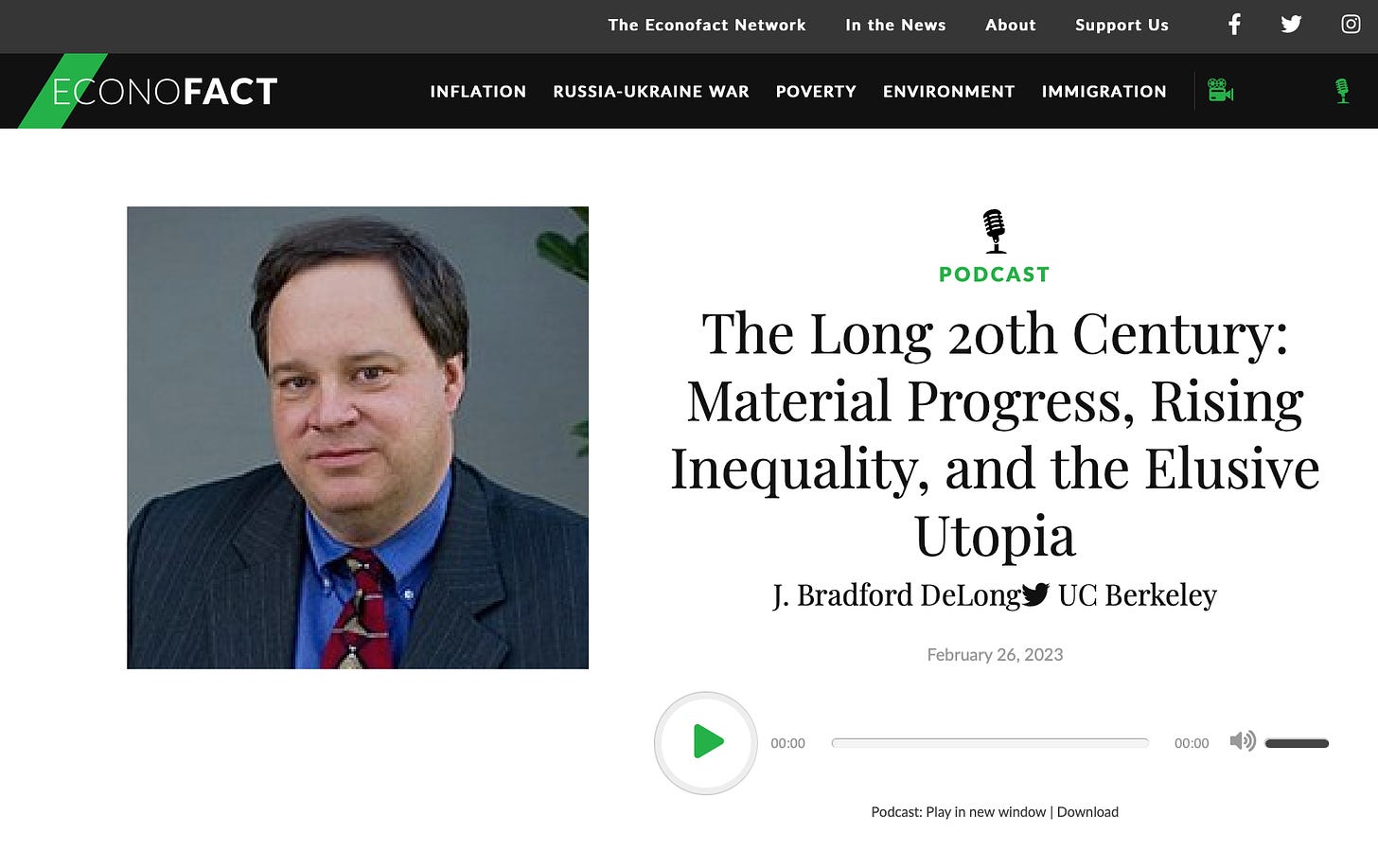ECONOFACT PODCAST: The Long 20th Century: Material Progress, Rising Inequality, and the Elusive Utopia; & BRIEFLY NOTED: For 2023-02-26 Su
"Mere anarchy is loosed upon the world...": stealing from William Butler Yeats Department; vaccines work; clark presents the logic of the Malthusian model of the economy; Blücher & Gneisenau...
FOCUS: ECONOFACT PODCAST: The Long 20th Century: Material Progress, Rising Inequality, and the Elusive Utopia:
The Long 20th Century: Material Progress, Rising Inequality, and the Elusive Utopia <https://econofact.org/podcast/the-long-20th-century-material-progress-rising-inequality-and-the-elusive-utopia> <https://overcast.fm/+oj77BbyXg>: The 20th century was defined in large part by the conflicts between free market-oriented ideas, and policies favoring government intervention to soften the effects of unbridled markets. It was also defined by broad increases in quality of life. Yet, even as material progress of the last 150 years greatly exceeded that of the previous thousands of years, it hasn’t led to the utopia that people in earlier, more materially dire periods, believed would come about. Drawing on his new book Slouching Towards Utopia <bit.ly/3pP3Krk>, J. Bradford DeLong joins EconoFact Chats to discuss why.
Brad is a Professor of Economics at the University of California at Berkeley. He served as the Deputy Assistant Secretary of the Treasury for Economic Policy from 1993 to 1995. Slouching Towards Utopia, was named one of the best business books of 2022 by The Financial Times:
“If you're going to steal, which I am, you steal from the best. William Butler Yeats is the best. Yeats was writing just after World War I, right? After 1870 you had had the two magnificent Belle Époque generations of economic growth at a pace the world never before. Those generations of 1870 to 1914 raised all kinds of utopian hopes of human progress. But then, from Yeats’s perspective, things seemed to go badly wrong. The British Tory party decides to partner with Protestant domestic terrorists in Ulster in order to disrupt moves toward Irish self-rule. World War I… is a huge, huge social catastrophe…. After the war, things do not appear to be going in a good direction either…. ‘Things are falling apart. The center cannot hold. Mere anarchy is loosed upon the world that we hoped would see a Second Coming, a New Jerusalem, descending from the clouds, adorned like a bride for live in. Instead, something is being born. But what is being born is not the Messiah, the Redeemer, the Redemption that we had hoped for.
“That is very true of today: Something is being born. But it is not the utopia of a peaceful, rich, and equal society of associated producers that people before 1870 would have been likely to expect, had you told them back then how much of a technological material cornucopia the century and a half after 1870 was going to produce…”
ONE IMAGE: Yes, Vaccines Work Well:
ONE VIDEO: The Logic of the Malthusian Model:
Greg Clark: The Logic of the Malthusian Model:
Very Briefly Noted:
August Wilhelm Anton Gneisenau: The Life and Campaigns of Field-Marshal Prince Blücher, of Wahlstatt… Wikipedia: August Neidhardt von Gneisenau Siege of Kolberg (1807)…
Arvind Narayanan & Sayash Kapoor ChatGPT is a bullshit generator. But it can still be amazingly useful: ‘Coding: the user can access ground truth: Debugging code is an application where programmers, especially novices, could benefit from LLMs.… The most valuable generative AI use cases are those where its abilities are complementary to humans…
Tyler Cowen ChatGPT and reading in clusters: ‘Just keep on “ChatGPTing” at least one identifier a page as you go along. Learn the context along the way. The final effect is a bit like reading surrounding books on the same topic…. This method is especially valuable when the topics are obscure…
Aidan Pollard: Remnants of 5,000-year-old tavern discovered in Iraq include an oven, refrigerator, benches for customers, and even an ancient beer recipe…
¶s:
Ethan Mollick: How to Get an AI to Lie to You in Three Simple Steps: ‘Asking it for more than it “knows” gets you lies…. If you are insistent enough on asking for an answer about something it doesn’t know, it will make up something, because “make you happy” beats “be accurate.” And they are very good at this… the whole nature of Large Language Models is that they are… very good at guessing at plausible… answers that feel very satisfying…. Assuming it is a person gets you lies…. There is no “there” there…. As soon as you start asking an AI chatbot questions about itself, you are beginning a creative writing exercise…. The AI is generally very happy to provide answers that fit into the narrative you placed it into…. Assuming it can explain itself gets you lies…. Why did it make that recommendation?… The AI will appear to give you the right answer, but it will have nothing to do with the process that generated the original result. The system has no way of explaining its decisions, or even knowing what those decisions were. Instead, it is (you guessed it) merely generating text that it thinks will make you happy in response to your query…









